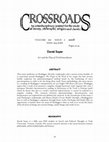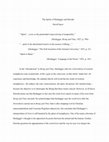Dissertation by David Sayer
One of the questions that most concerned Machiavelli remains with us today: what is the true, or ... more One of the questions that most concerned Machiavelli remains with us today: what is the true, or unerring, relationship between morality and politics? While Machiavelli is generally considered the first modern realist-since, in answering that question, he emphasized the role of power in affairs of state-what he thought about religion, morality and their relation to politics are still some of the most contentious questions about his writings. Machiavelli and the True Way offers a new comprehensive interpretation of his understanding of the relation between those three aspects of the human condition, situating his arguments in both their historical context and the history of ideas.
Conference Presentations by David Sayer
Papers by David Sayer

This essay meditates on Heidegger, Derrida, readymades and a certain erratic boulder. It is struc... more This essay meditates on Heidegger, Derrida, readymades and a certain erratic boulder. It is structured around Heidegger's The Origin of the Work of Art (1935); the first section briefly explicates his phenomenological method based on the bracketing of one's preconceptions in order to let the thing show itself. From methodology, the essay moves to a reading of Heidegger's interpretation of van Gogh's Old Shoes with Laces. Heidegger argues that a work of art presents a singular, though historical, truth. Against that view I juxtapose Derrida's deconstructive reading in Restitutions of the Truth in Pointing (1978) where he shows that due to a work's 'essential indeterminacy' it cannot be reduced to a singular reading. The tensions between phenomenology, deconstruction and hermeneutics are explored but not definitively resolved. In the second part of the essay, I read Duchamp's readymades and Maura Doyle's Erratic Boulder through a Heideggerian lens as well as Heidegger's argument through those works. Duchamp and Doyle offer an opportunity to further draw out some of Heidegger's ideas as well as to reveal the limits of his division of things into natural things, useful things and works of art.

In the "Introduction" to Being and Time, Heidegger calls for a Destruktion of western metaphysics... more In the "Introduction" to Being and Time, Heidegger calls for a Destruktion of western metaphysics and, in particular, of the cogito as the subjectum, as that which 'under-lies' all experience and knowledge. He explains that he will avoid the key terms of western metaphysics-the subject, the soul, consciousness, the spirit, the person, life, human beingbecause his objective is to interrogate the Being that those terms conceal. However, in Of Spirit, Derrida points out that Heidegger in fact uses the word Geist (spirit) in many of his texts from Being and Time onwards. He acknowledges that Heidegger uses the word Geist after the Destruktion carried out in Being and Time, that is after stripping it of its Christian transcendentalism and Cartesian-Hegelian subjectivity, but concludes that Heidegger's interpretation of Geist is still haunted by the ghost of metaphysics. One of his main criticisms of Heidegger's thought is the opposition he posits between the animal and the human. Further, Derrida questions his appropriation of the word Geist and the way he uses it to deepen the opposition between the human and the non-human-one of the few places where Heidegger affirms a traditional opposition of western metaphysics.
Drafts by David Sayer










Uploads
Dissertation by David Sayer
Conference Presentations by David Sayer
Papers by David Sayer
Drafts by David Sayer